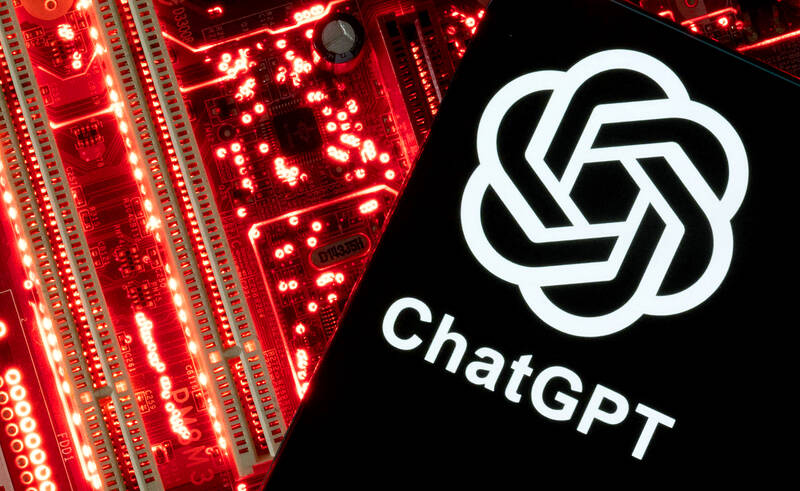Taiwan is working to launch its own version of a generative artificial intelligence (AI) in the form of a “shared model” by the end of this year, National Science and Technology Council Minister Wu Tsung-tsong (吳政忠) said on Wednesday.
Instead of a comprehensive system similar to OpenAI’s ChatGPT, Taiwan’s model is likely to target special areas such as finance and processing of confidential government data, Wu told a meeting of the legislature’s Education and Culture Committee in Taipei.
The decision was made because Taiwan has a limited budget for technology development of NT$132.7 billion (US$4.34 billion) per year, while OpenAI has already invested US$10 billion in the field, he said.

Photo: Reuters
Wu was responding to lawmakers’ questions about Taiwan’s progress in developing its own generative AI amid excitement over ChatGPT, which outputs natural text based on prompts from users.
The council is collaborating with local experts and businesses to build and edit a mega database before looking for international support to complete the advanced AI system, Wu said.
Asked about the economic impact of generative AI — as it is expected to be deployed across sectors — Wu said that “AI will not replace human beings, but people who do not take advantage of AI will be replaced by those who do.”
While industry insiders expressed similar optimism about the prospects of AI, some said it was a bad idea for Taiwan to develop its own version of ChatGPT.
It would be a waste of money to create something similar to the OpenAI invention, said Sega Cheng (程世嘉), chief executive officer of AI company iKala Interactive Media Inc (愛卡拉).
Taiwan should instead develop related applications, Cheng said.
It takes practical experience and skills to develop an AI, and the government should serve as a facilitator, bringing stakeholders together to discuss the future rather than being the sole decisionmaker, he said.
Cheng urged manufacturers and other businesses to introduce advanced AI systems immediately to provide value-added services.
“AI is no longer optional, but should rather be treated as basic infrastructure,” he said.

When an apartment comes up for rent in Germany’s big cities, hundreds of prospective tenants often queue down the street to view it, but the acute shortage of affordable housing is getting scant attention ahead of today’s snap general election. “Housing is one of the main problems for people, but nobody talks about it, nobody takes it seriously,” said Andreas Ibel, president of Build Europe, an association representing housing developers. Migration and the sluggish economy top the list of voters’ concerns, but analysts say housing policy fails to break through as returns on investment take time to register, making the

NOT TO WORRY: Some people are concerned funds might continue moving out of the country, but the central bank said financial account outflows are not unusual in Taiwan Taiwan’s outbound investments hit a new high last year due to investments made by contract chipmaker Taiwan Semiconductor Manufacturing Co (TSMC, 台積電) and other major manufacturers to boost global expansion, the central bank said on Thursday. The net increase in outbound investments last year reached a record US$21.05 billion, while the net increase in outbound investments by Taiwanese residents reached a record US$31.98 billion, central bank data showed. Chen Fei-wen (陳斐紋), deputy director of the central bank’s Department of Economic Research, said the increase was largely due to TSMC’s efforts to expand production in the US and Japan. Investments by Vanguard International

WARNING SHOT: The US president has threatened to impose 25 percent tariffs on all imported vehicles, and similar or higher duties on pharmaceuticals and semiconductors US President Donald Trump on Wednesday suggested that a trade deal with China was “possible” — a key target in the US leader’s tariffs policy. The US in 2020 had already agreed to “a great trade deal with China” and a new deal was “possible,” Trump said. Trump said he expected Chinese President Xi Jinping (習近平) to visit the US, without giving a timeline for his trip. Trump also said that he was talking to China about TikTok, as the US seeks to broker a sale of the popular app owned by Chinese firm ByteDance Ltd (字節跳動). Trump last week said that he had

STRUGGLING TO SURVIVE: The group is proposing a consortium of investors, with Tesla as the largest backer, and possibly a minority investment by Hon Hai Precision Nissan Motor Co shares jumped after the Financial Times reported that a high-level Japanese group has drawn up plans to seek investment from Elon Musk’s Tesla Inc to aid the struggling automaker. The group believes the electric vehicle (EV) maker is interested in acquiring Nissan’s plants in the US, the newspaper reported, citing people it did not identify. The proposal envisions a consortium of investors, with Tesla as the largest backer, but also includes the possibility of a minority investment by Hon Hai Precision Industry Co (鴻海精密) to prevent a full takeover by the Apple supplier, the report said. The group is